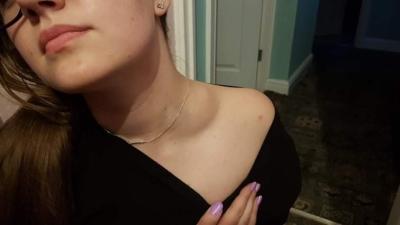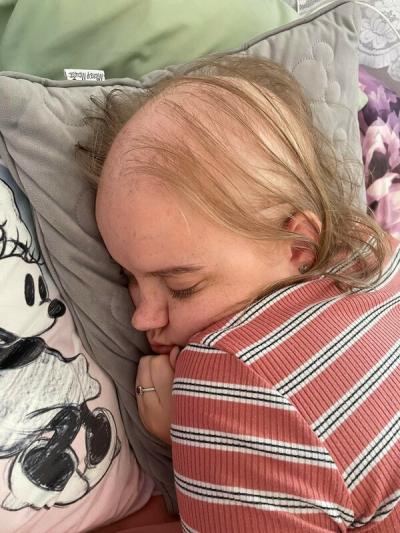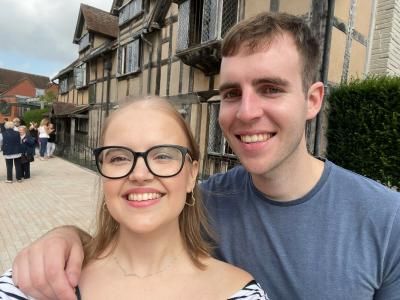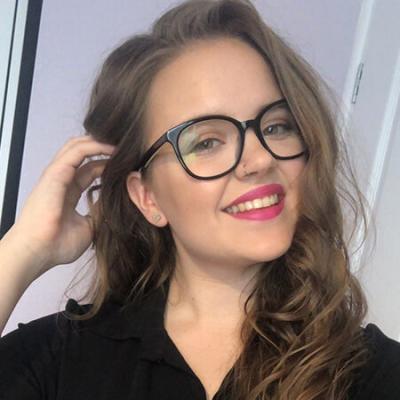How I got through cancer treatment
Hannah
Hannah, 23, reflects on the psychological impact of cancer treatment and the importance of getting the right support at the right time.
It started when a lump appeared under my left collarbone. I’ll never forget the consultant examining the lump and, after what felt like an eternity of silence, saying: ‘I really don’t like that at all. I think we will be having a difficult conversation at our next appointment’.
When I was told I had Hodgkin lymphoma, my first thoughts were for my poor parents, who were both devastated. My mum’s dad had passed away 24 hours before. She’d also recently been diagnosed with a non-cancerous brain tumour, and was still feeling the effects of radiotherapy. In the morning I’d been grieving for my grandad, and then I had this news. My mum was distraught, so I had to be strong for her.
Rosa, my Teenage Cancer Trust nurse, was there for me right from the start. She helped me get answers to my questions when I saw the doctors, she wrote out my treatment schedule, and if she wasn’t able to be with me, she’d message me to see how it had gone. We’d chat about everything, from family to holidays, and she did her best to keep me distracted from the chemo. I knew if I’d had a bad day I could call her.
When I first met Rosa, she’d told me that psychological support was available if I needed it. I felt OK at first, but when I started treatment I couldn’t see the light at the end of the tunnel. I have another medical condition, so I’ve been in and out of hospital my whole life, and I’d always had my parents with me. The coronavirus pandemic changed all that. I had to stay in hospital for five days and have my first dose of chemo, all by myself. That was very scary. After that I felt like I was going into a dark space. I suffered from anxiety and worried about leaving the house because I felt so vulnerable.
Having Rosa there made it easier to ask for help. She arranged for me to see a psychologist, who gave me different coping techniques, and if one wasn’t working for me, she’d suggest something else.
Help young people like HannahI suffered from anxiety and worried about leaving the house because I felt so vulnerable. Having Rosa there made it easier to ask for help.
After six long months, I finished my treatment, but then it was: ‘What do I do now?’ Your life revolves around treatment for so long, and then it all stops. To maintain a routine, Rosa suggested I make a list of things I’d like to do post treatment, such as days out or holidays. So I made a point of doing fun things on what would’ve been treatment days, turning days I normally dreaded into something more positive.
Now I’m back at work, and looking to the future. I’ve been travelling a lot with my boyfriend and next year we’re going to New York, which I’m really excited about. I was looking in the mirror the other day and I couldn’t believe that nearly a year ago I’d been completely bald! I’m going to get a remembrance tattoo, but I haven’t decided what to have yet.
In a way I’m grateful for this journey, because it’s allowed me to look at life from a different perspective and shown me that I can get through anything.
Rosa has been my rock through it all. Without her I would have been lost. I wouldn’t have known where to turn and the whole experience would have been scarier and more stressful. She still gets in touch regularly to check if I’m OK, and it’s hugely reassuring to know she’ll be there to support me for two years after my treatment. It’s been tough, but I’m also aware of how lucky I am.
Don't let young people like Hannah face the trauma of cancer alone
Without the right support, going through cancer can damage a young person like Hannah for life.
Facing cancer when you’re young can feel like the loneliest place in the world. You only get one chance at being young, and those few crucial years will shape the person you become.





